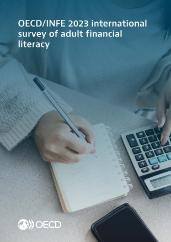OECD/INFE 2023 International Survey of Adult Financial Literacy
About the project
The OECD Recommendation on Financial Literacy states that collecting reliable and internationally comparable data to measure the financial literacy of adults is a key step in developing effective financial literacy national strategies and programmes. The OECD International Network on Financial Education (OECD/INFE) coordinates financial literacy surveys of adults among its members every three years. Assessing the levels of financial literacy in the population enables policy makers to identify gaps and design appropriate responses. International comparisons increase the value of such an assessment by enabling countries to benchmark themselves with other countries. Where similar patterns are identified across countries, national authorities can work together to find common methods for improving financial literacy within their respective populations.
|
Date of publication |
OECD/INFE 2023 International Survey of Adult Financial LiteracyDownload the full reportTélécharger la traduction française (avant-propos et résumé)Download the data here
14 December 2023 - Understanding current levels of financial literacy and needs is key for the effective development of financial literacy strategies and programmes. This report presents the results of an international survey of financial literacy levels among adults. A total of 39 countries and economies, of which 20 are OECD member countries, participated in this third coordinated measurement exercise using the globally recognized OECD/INFE 2022 Toolkit for Measuring Financial Literacy and Financial Inclusion to measure financial literacy levels among their adult populations. Results provide information about financial literacy levels and cover aspects of financial knowledge, financial behaviour and financial attitudes. In addition, the report provides information on financial inclusion, digital financial literacy levels and levels of financial well-being among adults in the participating countries and economies.
|
Related Documents


